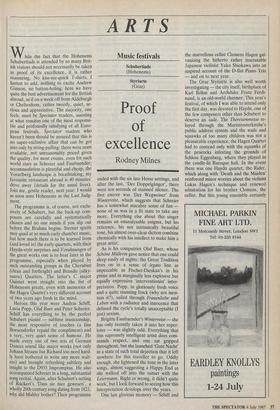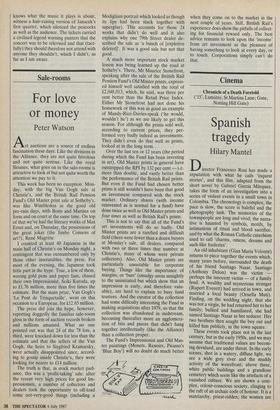ARTS
Music festivals
Styriarte (Graz)
Proof of excellence
Rodney Milnes
While the fact that the Hohenems Schubertiade is attended by so many Brit- ish visitors should not necessarily be taken as proof of its excellence, it is rather reassuring. No kiss-me-quick T-shirts, I hasten to add, nothing to excite Andrew Gimson, no button-holing: here we have quite the best advertisement for the British abroad, as if on a week off from Aldeburgh or Cheltenham, rather tweedy, quiet, se- rious and appreciative. The majority, one feels, must be Spectator readers, assisting at what remains one of the most responsi- ble and profoundly satisfying of all Euro- pean festivals. Spectator readers who haven't been should be assured that this is no super-exclusive affair that can be got into only by string-pulling: there were seats available, not unreasonably priced given the quality, for most events, even for such world stars as Schreier and Fassbaender; accommodation is plentiful and cheap; the Vorarlberg landscape is breathtaking; my favourite restaurant abroad is 40 minutes' drive away (details for the usual fiver). Join me, gentle reader, next year: I would as soon miss Hohenems as the Last Judg- ment.
The programme is, of course, not exclu- sively of Schubert, but the back-up com- posers are carefully and systematically chosen and no one minds if you slip out before the Brahms begins. Sterner spirits may quail at so much early chamber music, but how much there is to be learned from (and loved in) the early quartets, with their Haydn-style surprises and Vorahnungen of the great works one is to hear later in the programme, especially when played by such outstanding groups as the Cherubini (clean and forthright) and Brandis (silky- suave) Quartets. The latter's C major Quintet went straight into the list of Hohenems greats, even with memories of the Hagen Quartet's very different account of two years ago fresh in the mind.
Heroes this year were Andras Schiff, Lucia Popp, Olaf Baer and Peter Schreier. Schiff has everything to be the perfect Schubert pianist — sublime musicianship, the most responsive of touches (a fine Boesendorfer repaid the compliment) and a very, very quiet sense of humour. He made every one of two sets of German Dances sound like major works (not only Johann Strauss but Richard too need hard- ly have bothered to write any more walt- zes) and brought refreshing subtlety and Insight to the D935 Impromptus. He also accompanied Schreier in a long, substantial song recital. Again, after Schubert's setting of Ruckert's `Dass sie bier gewesen', a wholly 20th-century song dating from 1823, why did Mahler bother? Their programme ended with the six late Heine settings, and after the last, Der Doppelganger', there were ten seconds of stunned silence. The first encore was Der Wegweiser' from Winterreise, which suggests that Schreier has a somewhat macabre sense of fun none of us was in a fit state to take any more. Everything else about this singer remains an unanalysable enigma, but his reticence, his not intrinsically beautiful tone, his almost over-clear diction combine chemically with his intellect to make him a great artist.
As is his compatriot Olaf Baer, whose Scheine MUllerin gave notice that one could sleep easily of nights: the Great Tradition lives on in a sense of legato line as impeccable as Fischer-Dieskau's in his prime and in marginally less explosive but equally expressive 'interventionist' inter- pretation. Popp, in gloriously fresh voice and a quite stunning frock (why not men- tion it?), sailed through Frauenliebe and Leben with a radiance and innocence that defused the cycle's totally unacceptable (I jest) sexism.
Brigitte Fassbaender's Winterreise — she has only recently taken it into her reper- toire — was slightly odd. Everything that this supremely intelligent artist does com- mands respect, and one sat gripped throughout, but she launched `Gute Nacht' in a state of such total dejection that it left nowhere for this traveller to go. Oddly enough, she lightened the tone in the later songs, almost suggesting a Happy End as she walked off into the sunset with the Leiermann. Right or wrong, it didn't quite work, but I look forward to seeing how this interpretation develops over the years.
One last glorious memory — Schiff and the marvellous cellist Clemens Hagen gal- vanising the hitherto rather inscrutable Japanese violinist Yuko Shiokawa into an inspired account of the D-flat Piano Trio — and on to next year.
The Graz Styriarte is also well worth investigating — the city itself, birthplace of Karl Bohm and Archduke Franz Ferdi- nand, is an old-world charmer. This year's festival, of which I was able to attend only the first day, was devoted to Haydn, one of the few composers other than Schubert to deserve an -fade. The Theresienmesse re- layed through the Mariatrosterkirche's public address system and the wails and squawks of too many children was not a pleasurable experience; the Hagen Quartet had to contend only with the squawks of the peacocks infesting the grounds of Schloss Eggenberg, where they played in the candle-lit Baroque hall. In the event there was one Haydn quartet, the Rider, which along with 'Death and the Maiden' reinforced minor worries about the violinist Lukas Hagen's technique and renewed admiration for his brother Clemens, the cellist. But this young ensemble certainly knows what the music it plays is about, witness a hair-raising version of Janacek's first quartet, which silenced the peacocks as well as the audience. The tickets carried a civilised legend warning punters that the concert was to be televised and that (tact- fully) they should therefore not attend with anyone they shouldn't, which I didn't, as far as I am aware.



















































 Previous page
Previous page